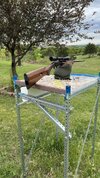berettaprofessor
Member
Hey all; I was shooting one of my favorites today, the Browning SA-22 short below. I bought it from CDNN about 6 years ago and find it to be one of the more frequent plinkers I pick up; it's 22 short, so no recoil or noise to bother me or the neighbors and, anyway, it's just gorgeous. Scoped with a Leupold cantilever base and a Leupold 1.5-6x scope, it's all I need for the rifle's range, and it's about a 3MOA shooter in my hands at 60 yards. I'm not fond of the trigger though, never measured it but its got to be in the 7-8 lb range and not the cleanest "wall" I've encountered.
Anyway, because of the trigger today, I found myself concentrating more on trigger technique, squeeeeeze and keep the crosshairs on target, breathe and shoot between breaths, and slowing down between shots. I'm wondering if my rifles of crisper triggers and 1.5-2.5# are actually working against me, letting me be lax on fundamentals? Anyone else ever feel like they work more carefully, technic-wise with a bad trigger?

Anyway, because of the trigger today, I found myself concentrating more on trigger technique, squeeeeeze and keep the crosshairs on target, breathe and shoot between breaths, and slowing down between shots. I'm wondering if my rifles of crisper triggers and 1.5-2.5# are actually working against me, letting me be lax on fundamentals? Anyone else ever feel like they work more carefully, technic-wise with a bad trigger?


